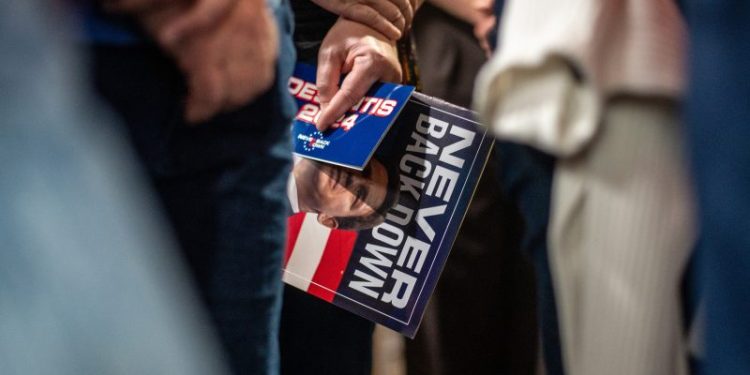“Campaign Funding Tensions Flare: Ron DeSantis Pushes for Change
For years, Florida politicians have been looking for ways to stop the influx of big-money donations that often come with major elections. But when Ron DeSantis, then a Congressman running for the state’s governor, proposed a major campaign-finance reform bill in 2018, the fights began.
Since taking office in 2019, DeSantis has pushed for placing limits on campaign contributions and strict regulations on donors. The proposal has brought criticism from all sides of the political spectrum, from those who worry it will limit free speech to those who think it won’t do enough to prevent corruption.
At its core, the proposal looks to set clear restrictions on the amounts that can be donated to a candidate and the types of influence donors can have. It would also create a Comprehensive Campaign Finance System, which would bring all donations into one system, with a single database accessible to the public.
Supporters of the plan argue that it would go a long way in curbing some of the issues with campaign finance reform. Ideally, it would help make elections fairer and more equitable by empowering smaller donors and preventing big money from dominating campaigns.
Critics worry that the plan could be easily manipulated by those with the resources to do so. They point to the lack of protection for political action committees and claim that those wealthy donors could still have a hand in deciding the outcomes of elections.
No matter which side of the debate you stand on, it’s clear that campaign finance reform is an issue of great importance in Florida. The state has long been a hotbed for fundraising activity, and lawmakers have yet to put together a plan that can truly bring about change.
For now, Governor DeSantis’ proposal remains in limbo, and it’s not clear when or if it will come to fruition. But one thing is certain: as long as money plays such a pivotal role in politics, the fights over how campaigns are funded are sure to continue.
For years, Florida politicians have been looking for ways to stop the influx of big-money donations that often come with major elections. But when Ron DeSantis, then a Congressman running for the state’s governor, proposed a major campaign-finance reform bill in 2018, the fights began.
Since taking office in 2019, DeSantis has pushed for placing limits on campaign contributions and strict regulations on donors. The proposal has brought criticism from all sides of the political spectrum, from those who worry it will limit free speech to those who think it won’t do enough to prevent corruption.
At its core, the proposal looks to set clear restrictions on the amounts that can be donated to a candidate and the types of influence donors can have. It would also create a Comprehensive Campaign Finance System, which would bring all donations into one system, with a single database accessible to the public.
Supporters of the plan argue that it would go a long way in curbing some of the issues with campaign finance reform. Ideally, it would help make elections fairer and more equitable by empowering smaller donors and preventing big money from dominating campaigns.
Critics worry that the plan could be easily manipulated by those with the resources to do so. They point to the lack of protection for political action committees and claim that those wealthy donors could still have a hand in deciding the outcomes of elections.
No matter which side of the debate you stand on, it’s clear that campaign finance reform is an issue of great importance in Florida. The state has long been a hotbed for fundraising activity, and lawmakers have yet to put together a plan that can truly bring about change.
For now, Governor DeSantis’ proposal remains in limbo, and it’s not clear when or if it will come to fruition. But one thing is certain: as long as money plays such a pivotal role in politics, the fights over how campaigns are funded are sure to continue.










